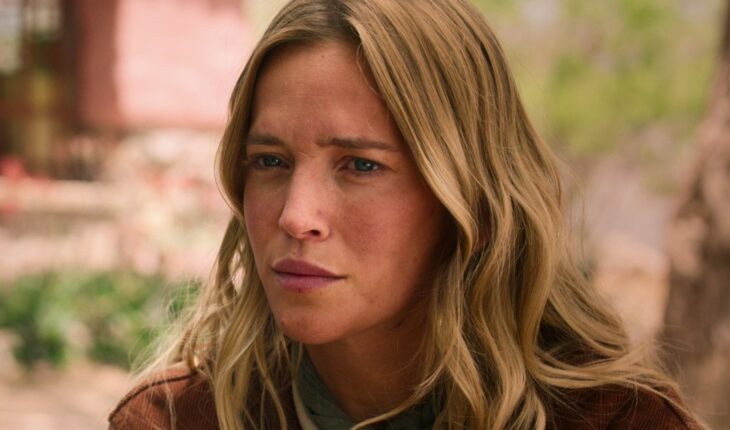Willing to go unnoticed in northern Argentina, Manuela Pelari promises herself a life without violence, “without Pipa,” she says. The officer specialized in Violent Crimes dissociates herself from her kind of alter ego, and little seems to remain of her, except for the images over the years more eroded, of the last case that she could not solve: when she decided to let go of the trafficker Cornelia Villalba, link of a matter as personal as professional that somehow -paradoxically to what she could not with the mourning of her lost friend- sought to bury in Buenos Aires to follow. Ten years later, installed in a village of La Quebrada at the proposal of her aunt and already with a son, the first scene of the film shows her planting. Because it is Pipa to whom his aunt Alicia will turn with the passing of the scenes, to ask him to investigate the death of the young Samantha Sosa (played by Laura González), whom they last saw the night she worked for the party of the Carreras Family, the wealthy landowner clan. Thus, as a closing of this kind of epic, Luisana Lopilato promises to be Pipa again, for the last time.
This is what “Pipa” is about, the third film of the saga that they compose with “Perdida” (2018) and the prequel “La Corazonada” (2020) that being the first Argentine film for Netflix, thus began the first national original franchise of the platform, and with it gave way to the list of productions Made in Argentina (as its slogan bears, an increasingly rising content).
Luisana Lopilato | Photo: Courtesy of Netflix
“I’m happy with the result of the film, I want you to see it, to enjoy it,” Luisana Lopilato tells Filo.News excitedly. “I think it’s the best of the three in every way: it shows our country, it has a very nice photo, the performances are all very good, and the story is still strong, it attracts you. At least to me that’s what happened to me: I was thinking all the time ‘what’s going to happen now’, and that I was part of the film and I knew what was going to happen, so and everything there were details that surprised me, “he says.
Luisana Lopilato is “Pipa” | Photo: Courtesy of Netflix
It is based on the character—heroine conceived by journalist Florencia Etcheves for La Virgen en tus ojos (2012), and four years later, her Manuela “Pipa” Pelari arrives in theaters but with the adaptation of Cornelia (the author’s third book, 2016). Moment that the streaming company acquired its rights to make the franchise that continued, as we said with “La Corazonada”, inspired by the first copy of the saga. Moment in which the author also expressed to Filo.News her emotion to learn that the actress was going to give life to her policeman -in her words- with “a completely different record to what Luisana is. When I was told it was going to be her, I loved it. I thought they were going to say no to me because she lives in another country but they gave me the good news: “she already said yes”. And I said, “Wow but Luisana in such a role,” and the truth is that when you’re a good actress you can do whatever you want. Luisana with her body, with her face and her expressions does what she wants, she is wonderful,” she told us in this note. Pipa” is emancipated from the literary universe (which continues until the fourth, La Sirena, 2019) and it is surprising that it is not the adaptation of La hija del Campeón (the second, 2014). Although in any case he maintains the creative team of his previous films headed by the director Alejandro Montiel, with his script in work with the producer Mili Roque Pitt and Etcheves.
Inés Estévez, Luisana Lopiato and Aquiles Casabella | Photo: Courtesy of Netflix
The performances are led by a cast that integrates both recognized and recognized artists such as Inés Estévez (“Pequeña Victoria”, “Victoria”), Mauricio Paniagua (“Monzón”, “Trópico”), Ariel Staltari (“Okupas”, “El Marginal” 4 and 5), Malena Narvay (“100 days to fall in love”, “I adolescent”), the Chilean actress Paulina García (“Gloria”), Aquiles Casabella and talents from the provinces of Salta and Jujuy.
The film carries a style in the direction that takes elements of the western creating something like a comic in cinema format. An outstanding photograph (by Guillermo Nieto), shots, scenic display and panoramic shots (sample of the magnitude of Netflix productions) superimpose a weak script that respects the format of his previous films: a main plot, which has with other investigations -plot lines- that function as subplots, the resolution that becomes more evident as the story progresses, and the conflict of social classes as one of the axes.
“Pipa” | Photo: Courtesy of Netflix
The best success of this film was the objective of representing the problems faced by the original communities in the North of our country: where from the government, and wealthy families in the area prohibit the passage and use of land, where many girls and women are victims of the so often denounced chineo (problem probed in the film), among so many situations of inequality. The women as protagonists of the film, multiple maternal bonds (from Pachamama, the land as home; the bond of Alicia the girls of the community, with Manuela, of Manuela with Tobias, and of Etelvina with her son and daughter; the ancestor town of the land for which she fights), and parents in another narrative plane (such as Commissioner Mellino), are other themes that are developed in “Pipa”. On the most personal level, Luisana is going through her fourth pregnancy with her husband, the artist Michael Bublé, whom she currently accompanies on her tour of Europe, along with her sons and daughter, Noah, Elías and Vida.While in the professional, she prepares the premiere of the theatrical version of the television comedy “Casados con hijos”, together with her brother Darío Lopilato, Guillermo Francella, Florencia Peña, Marcelo De Bellis and the recently confirmed Jorgelina Aruzzi, rescheduled by the pandemic to arrive at the Gran Rex on January 5, 2023. At the same time that he keeps new projects in his agenda.
Pipa returns and at the same time it is a closure, how do you live this return? Recently I read you and there is something they share with Pipa: that travel to another place where they form a home, which in your case is always accompanied by projects that make you return home.
Look, I hadn’t thought so. I had been asked what I thought united me with Pipa but I hadn’t thought about this and it’s true. The truth is that I really liked seeing and making the film.
It is the first of the films that is not based on a book by Florencia Etcheves, how much did you get involved with the creative decisions and from the assembly?
The truth is that Florencia Etcheves, Mili Rocket Pitt and Alejandro Montiel did a very good job: you can tell that they put together a group and have very good chemistry between the three of them to be able to write and create projects. From my side, what I was most concerned with was seeing how to bring this Pipe back and find a way to do it as it is written: more mature, who wants to get away completely from the police, does not want to be related to injustice, wants to clean up his past. Although she has no choice and has to get involved at a very special request from her aunt who, knowing her past in the police and her experience in Violent Crime positions, tells her that she is the only one who can know what really happened to find justice.
Luisana Lopilato is “Pipa” | Photo: Courtesy of Netflix
Pipa returns as a mother in this film, which also shows various forms of motherhood, how did you live this in the character? How did motherhood change you? And how do you live your pregnancy?
I remember that we talked about it a lot when we were rehearsing and making the film: what is Pipa like as a mother? Is Pipa a mother like Luisana? I hug and kiss my children and there is not a day that I do not get up and tell them that I love them.Pipa is that kind of mother or for everything she lived is a little more distant, distrustful of everything that surrounds her son? More protective. Already a mother is protective. We had all those talks when we sat down to reread the books.
Pipa is a strong female character that also marked you in acting, do you feel that somehow that allowed you to explore other facets, which proposed to run a little of what society or productions expected of you, of mandates that often want us women “always beautiful” or fulfilling certain roles?
As an actress I love challenges and I’m always willing to take them when I get characters or books. I think that’s the beauty of acting, and then the not so nice thing is that before they say “action” you feel like an adrenaline rush and say “oh why I chose this”, “why I wanted to be here” (laughs). But once they say “action” it’s a journey. I think I became a fan of film and filmmaking. I really enjoy the process.
In the film the women have the prominence of the story. Do you feel like a feminist? How do you find all this rethinking ourselves on a social level?
Well, very good. I think the changes are positive and good in every way. I think there should be more pipes in the world. And yes, I feel very identified. (I always say the same thing) changes are always good, you have to accept them and face them in the best way.
Luisana Lopilato is “Pipa” | Photo: Courtesy of Netflix
In the film Pipa repeats a lot “You don’t know me”. As a game with your dialogue: what things do we not know about Luisana?
AndIt’s weird because I’ve been working for so many years, since I was so young, that I think they know everything about me. And I think that’s a little bit why people follow me: from social networks, or on the street when they stop me, I get so much love but because it’s also the way I show myself; there is nothing different or that can be hidden. Of course they don’t know how I wake up in the morning or how I sleep. I have opened the doors to many people in my life, everything around me and it makes me happy to be able to share about myself, my personality and my family, with the people, who are the ones who return love to you every day. I get more positive feedback than negative feedback. So I don’t have time to read a negative message, of so much good vibes that people have and so many years that follow me. It happens to me that people stop me on the street and tell me “I grew up with you”. The other day I was in a square with my children and I was stopped by a girl from Israel, who was with her children as well. She looked at me, she looked at me. And I was like, “Maybe you think I’m Michael Bublé’s wife.” He came over, spoke to me in English and said: —I learned to speak Spanish for you, for the series of “Rebelde Way”— (Cris Morena series that turned 20 years old and is available to watch on Netflix with the spin-off, “Rebelde”). The truth is that that love that people give back to you, comes to me, I receive it and I appreciate it every day. Luisana Lopilato returns with the character of Manuela Pelari in “Pipa”, the new film made in Argentina for Netflix, a platform in which as a false spoiler, or a similar post-credits scene of this note, she will return soon with the premiere of “Matrimillas”, a romantic comedy by Sebastián de Caro, with Juan Minujín.
In this note:





